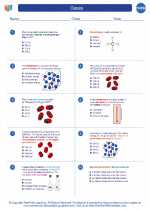Modern Physics
Modern physics is the branch of physics that deals with the study of the behavior of matter and energy at the atomic and subatomic levels. It includes the study of quantum mechanics, relativity, nuclear physics, and particle physics.
Key Concepts in Modern Physics
- Quantum Mechanics: Quantum mechanics is the branch of physics that deals with the behavior of particles at the atomic and subatomic levels. It describes the wave-particle duality of matter and the probabilistic nature of quantum phenomena.
- Special and General Relativity: Special relativity, developed by Albert Einstein, describes the behavior of objects moving at high speeds, while general relativity describes the behavior of objects in gravitational fields.
- Nuclear Physics: Nuclear physics is the study of the behavior and properties of atomic nuclei, including nuclear reactions and radioactive decay.
- Particle Physics: Particle physics deals with the study of the fundamental particles that make up the universe and the forces that govern their interactions.
Study Guide for Modern Physics
To effectively study modern physics, it is important to have a strong foundation in classical physics, including mechanics, electromagnetism, and thermodynamics. Additionally, the following topics should be covered:
- Quantum Mechanics: Understand the principles of wave-particle duality, the Schrödinger equation, quantum states, and the behavior of particles in potential wells.
- Special and General Relativity: Study the concepts of time dilation, length contraction, the equivalence principle, and the bending of light in gravitational fields.
- Nuclear Physics: Familiarize yourself with the structure of the atomic nucleus, nuclear forces, nuclear reactions, and types of radioactive decay.
- Particle Physics: Learn about the Standard Model of particle physics, the fundamental particles (quarks, leptons, bosons), and the four fundamental forces (gravity, electromagnetism, weak nuclear force, strong nuclear force).
Additionally, solving problems and working through numerical exercises related to these topics is crucial for a comprehensive understanding of modern physics.
.◂Chemistry Worksheets and Study Guides High School. Gases
The resources above cover the following skills:
Physical Science
Energy - A. Energy is involved in all physical and chemical processes. It is conserved, and can be transformed from one form to another and into work. At the atomic and nuclear levels energy is not continuous but exists in discrete amounts. Energy and mass are related through Einstein's equation E=mc 2 . B. The properties of atomic nuclei are responsible for energy-related phenomena such as radioactivity, fission and fusion. C. Changes in entropy and energy that accompany chemical reactions influence reaction paths. Chemical reactions result in the release or absorption of energy. D. The theory of electromagnetism explains that electricity and magnetism are closely related. Electric charges are the source of electric fields. Moving charges generate magnetic fields. E. Waves are the propagation of a disturbance. They transport energy and momentum but do not transport matter.
Relate temperature to the average molecular kinetic energy.



